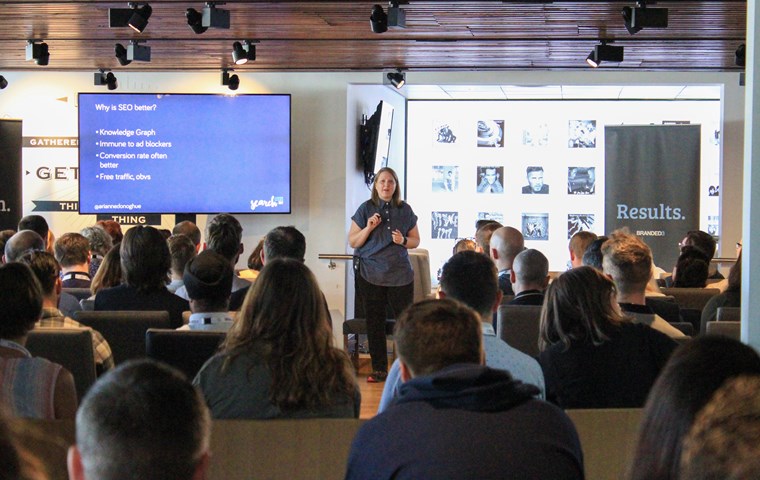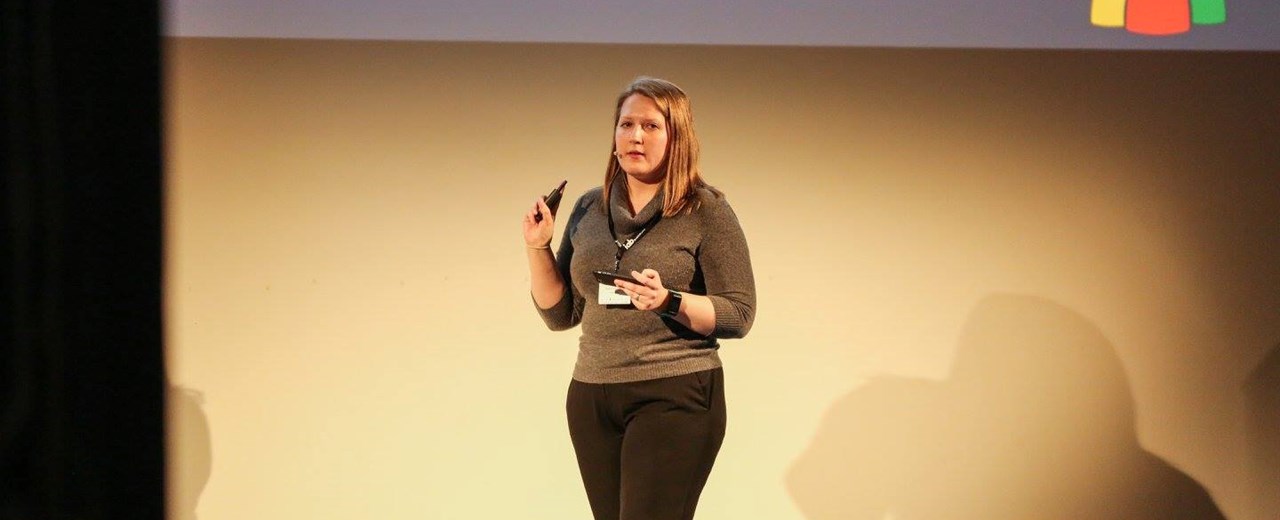Public speaking is a major fear for so many people - ranking higher than the fear of heights, clowns, spiders, snakes and, apparently, even death. I can believe this, as I would say I felt more nervous at my first proper speaking “gig” than I did when I got married, or jumped out of a plane. Now, I have a job which requires public speaking on a regular basis. Why would I, as an introverted, autistic, ISFJ-T, put myself through this, I hear you ask, and why should you?
Putting yourself out there and getting up on stage has a number of huge benefits, despite how scary it might seem. It’s an amazing way to get you and your personal brand out there and establish yourself as someone who is great at what they do. That is, of course, once you get past the “I have nothing to say and even if I did, why would people want to listen to me, because I am rubbish”, phase.
But how do you get past that phase, particularly when Imposter Syndrome is telling you to not bother? Fake it till you make it! Seriously.
Stages of public speaking:
— Natmate (@NatDudley) January 25, 2018
1. There are so many topics I can’t pick one
2. I have nothing to say and I will never be able to fill all the time.
3. Oh god I have too much to say how do I get rid of some of it.
4. I need to puke from nerves.
5. That was awesome let’s do it again.
Regardless of whether you pitched to speak, or were asked, the most important thing you can bear in mind is that the people who invited you to their event believe in your planned content and, more importantly, in you as a presenter.
Another great reason to do it is the confidence boost and adrenaline rush you get when you come off-stage. While some of it will undoubtedly be relief at having gotten through it/not thrown up/not fallen over, there will be a big rush of endorphins and you’ll feel great - you’ll have done something many other people fear doing, and in doing so have imparted valuable knowledge to those who listened to you.
My third reason to try your hand at public speaking, particularly as a woman, is to try and be a role model to other females in the industry. You’ll be the one to prove there are talented women who are not afraid to get up and let themselves be heard. You’ll show event organisers that there are plenty of women out there willing to speak at events to help change the ratio. And by sharing your knowledge, you’re the one showing other women that you want to help them follow you up the ladder.

What if you’re willing to give public speaking a go, but have no idea where to start? Here are some of my top tips:
- Pitch to speak! If you want to speak at an event, maybe one you’ve attended before, contact the organisers and submit an idea for a session. Often, events will have a page dedicated to speakers, with links on how to pitch and details on what the organisers are looking for
- Put together a list of events relative to the niche that you work in. In my case, that’s paid advertising so I have a list of over a dozen events that I would love to speak at including, one day, the TED stage (gotta dream big!).
- Think outside the box! Look at other local events in your area, through platforms such as Meetup or Eventbrite and you might find smaller, more niche events that could be a great platform for your first speaking gig. For example in Leeds, we have organisations like Glug, Hey!, Bettakultcha, Ladies of Code and of course, She Does Digital - all of whom are worth approaching and would be thrilled to welcome new speakers to their ranks.
- Use your network - speak to any colleagues or acquaintances you have in the industry and tell them you’d love to be considered. Make their job easier by listing the kinds of things you’d love to talk about - if they ever get asked about new speakers they could recommend, they’ll be in a better position to put you forward. Conference organisers are always on the hunt for new voices and they’ll use their existing contacts to do this - I’ve lost count of the number of times I’ve been asked to speak because someone who knows me, or saw me speak before, referred me.
- Harness the power of social media! Get on Twitter and LinkedIn in particular and talk about your desire to speak, and on what topics. Ask your connections to share, or tag in relevant contacts - it can be a great way to get your desire noticed.
- Intimidated by the amazing speakers you’ve seen on stage at TED or other events? Don’t be! Public speaking comes naturally to pretty much nobody - I promise you that it’s all the result of hard work and practice - which means it’s achievable for anyone. Don’t let the fear of not being as good as so-and-so, get you down.
- Allow yourself plenty of time to prepare. I once heard a rule of thumb that for every minute you’ll spend delivering your presentation, it takes at least one hour of prep time, so a 20-minute presentation would be at least 20 hours of prep. Personally, I find it takes a lot longer than that - from outlining my talk, putting together slides and rehearsing my timings and flow. Don’t worry if preparation is taking you a long time - it will pay off in the end with better delivery - but you have to allow yourself enough time so that you feel comfortable and rehearsed by the time the big day comes around.
- Always ask organisers for guidelines - what format they need for any supporting material, whether there’ll be a Q&A, how timings will work, etc. - knowing what to expect going in will help you feel more prepared and eliminate potential issues.
- Ask someone you trust to sit down and be your audience - present to them and ask them for honest and constructive feedback. This helped me to no end when a friend pointed out how long it sometimes took for me to appear comfortable - I now structure the beginning of my talks differently, so that I feel more confident at the start - which flows through into the rest of my presentation!
Remember that the people who invited you to their event believe in your planned content and, more importantly, in you as a presenter.
Finally, here’s a list of resources it’s worth looking at:
- TED - possibly one of the best known forums for public speaking - filled with amazing talks from inspirational speakers. Pick a topic or speaker you like and spend a few hours learning!
- Glug - work as a creative in any way? You should check out their events - they’re global, so chances are there’s one near you.
- Eventbrite & Meetup - two of the best-known platforms for finding events to attend.
- Manyminds “Give It A Go” Tour - a conference designed specifically for people in digital looking to speak at their first event.
- Use Unsplash, Pexels and Pixabay for royalty-free images that you can use to make your presentations looks amazing.
- Toastmasters - they have a huge library of resources you can take a look at.
- This LinkedIn article is great for talking about what makes a “perfect” keynote, according to IBM’s Watson.
Finally, if you want some feedback on what makes a good Powerpoint presentation for public speaking, this TED talk is a great watch!


